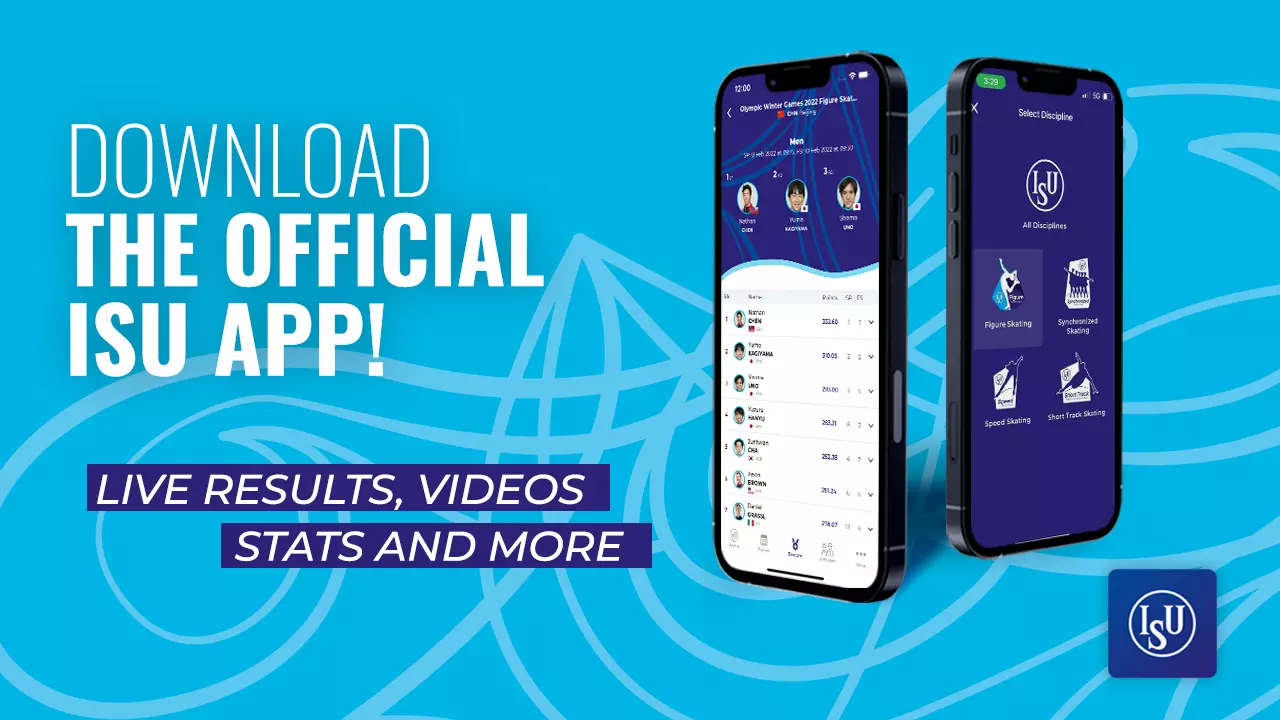Miho Takagi (JPN) thrived on the support of her home crowd to collect two gold medals on the second day of the season-opening Speed Skating World Cup at the Meiji Hokkaido Tokachi Oval. The Obihiro native left the rest of the field almost two seconds behind in the 1500m, and went on to dominate the Team Pursuit together with Momoka Horikawa and Ayano Sato.
Femke Kok (NED) started the competition on Saturday with gold in the second 500m to go on top of the 500m ranking together with Kimi Goetz (USA), who came third after Friday’s win.
Sloppy race but better time for Kok
With a time of 37.82s, Kok was one of the few women to skate faster than she had done the day before, improving by an 0.04s margin. She couldn’t quite explain why, because she thought her race felt sloppy.
“Actually it was not such a good race, but it was faster so that’s nice and I won, so I was content with that too,” she said.
“I felt that I had more power today, but it was sloppy and unstable. Sometimes when I’m really good, I can feel that every stroke is bullseye, but today I just lost it every now and then.”
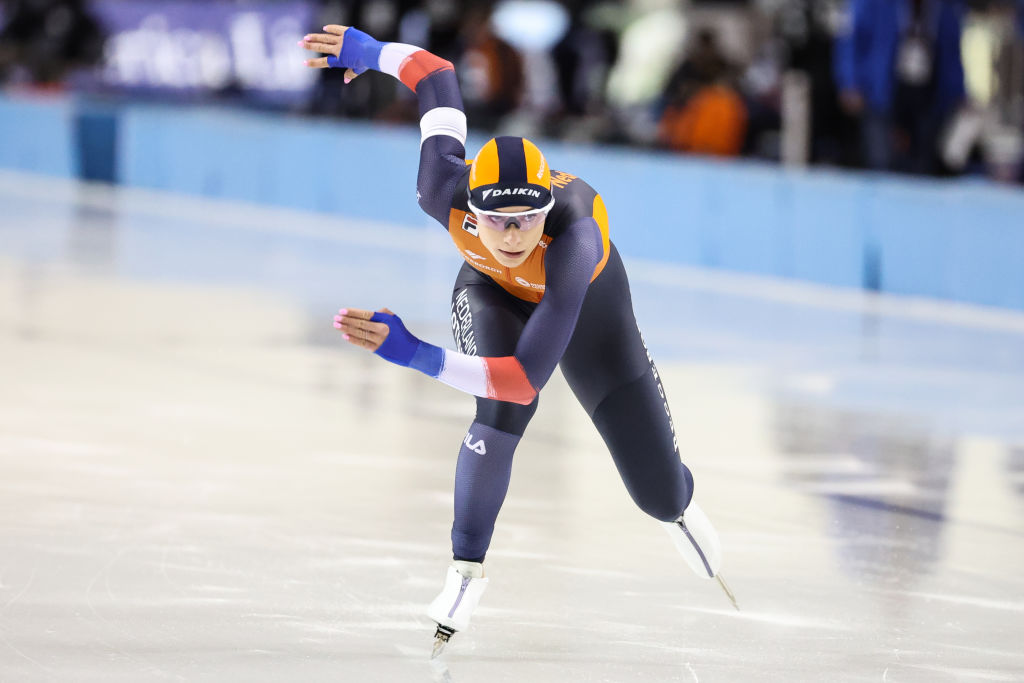
Femke Kok (NED) improved on her Friday time to take gold in the 500m, but confessed to a 'sloppy' skate © ISU
Starting the season on top of the 500m World Cup ranking was a confidence boost for Kok.
“Last year I finished fourth so often, it’s great to be on top for a change. It shows that my base is much better than it was last year, so I hope to pull it through.”
Leerdam smashed her own Friday mark by 0.43s to finish in 38.00s. She jumped from 10th to second place, and she knew exactly how that had come about.
“Yesterday I almost crashed, that mistake cost me at least three tenths of a second, so today I started without too many expectations.”
“I had a bit more muscle tension, yesterday I was very loose. I always get into it better once I’ve got a race down, but I still had a mishit in the opener. I might have gotten closer to [to winning gold], but it’s never perfect.”
With a time of 38.13s, Friday’s gold medalist Kimi Goetz was 0.31s slower than she had been on the first day, but still managed to keep Erin Jackson (USA) 0.02s behind to secure bronze.
“Erin and I were joking that all the last five 500 meters we’ve done, we were within three hundredths of each other, so I landed on the lucky side today.”
Despite the 500m not being her main target for the season, Goetz saw her name in joint first position in the distance after the first World Cup weekend. That may shift her plans for the World Cup season a little, she explained.
“It was not a goal going into this competition, we even talked about skipping some [500m races], because I’m racing a lot with the Team Sprint, the 1500m, and the Mixed Gender Relay, but now, maybe we need to reassess a little if we want to stay on top of the board,” she said.
Goetz picks up fourth medal but Takagi storms to 1500m gold
Following her 500m performance, Goetz picked up another bronze medal in the 1500m, which she considered to be an even bigger surprise.
“The only person who thought I could win a 1500m would be Mitch [coach Mitchell Whitmore]. Somebody’s telling me every day I can do it, so maybe now I believe him a little bit.”
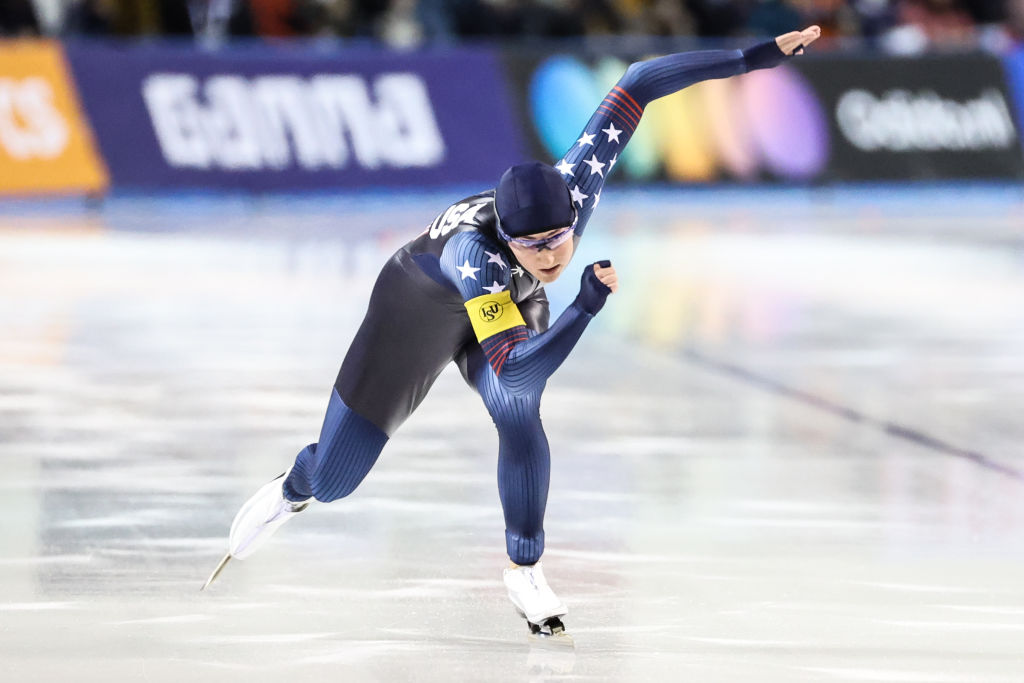
Kimi Goetz (USA) added a surprise bronze in the 1500m, taking her Obihiro medal tally to four © ISU
Whitmore had managed to change Goetz’s mindset, she explained.
“One of my main goals this season was to get a little more confidence in the 1500m, so after a very hard training Mitch would say: OK you’re doing a 1500m, just keeping me on my toes, doing five-lap tempos, which I’ve never done in my life.
“It’s just little bits and pieces, maybe physically it doesn’t make too much of a difference, but mentally it does. It's just like wrapping my head around [the fact that] I can do longer efforts.”
Although she was happy about her 1500m showing, Goetz was still 2.02 seconds off the gold in the 1500m. Miho Takagi crushed the field, stopping the clock at 1:54.54.
“This is my home town, I know how to skate a 1500m here,” said a smiling Takagi, who made amends for her silver medal in the 1000m on Friday with gold at the longer distance.
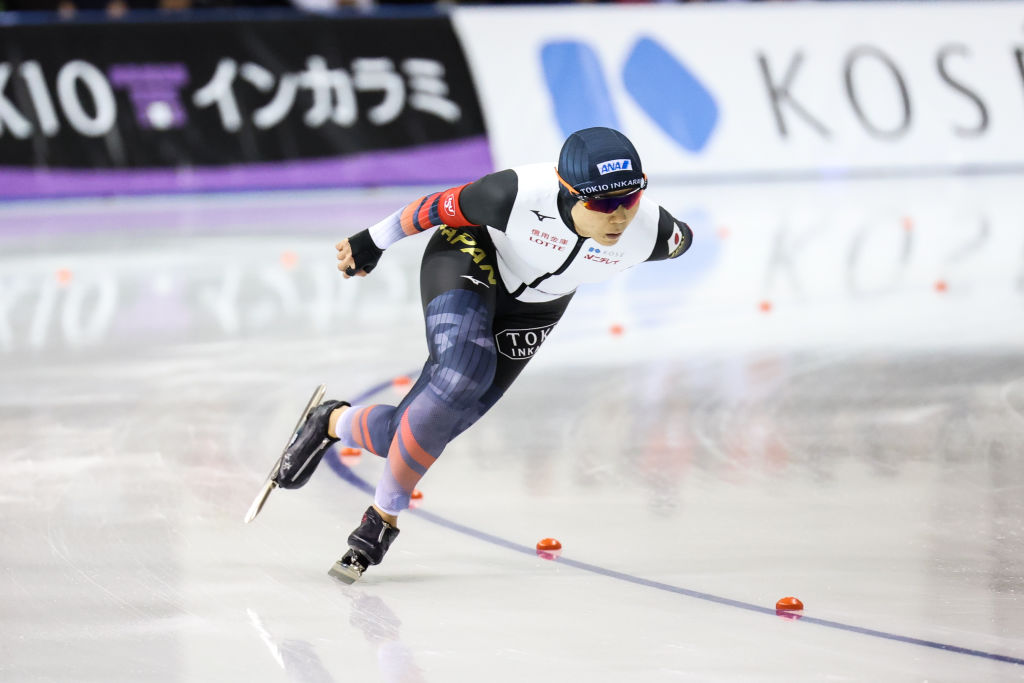
Silver in Friday's 1000m, Miho Takagi (JPN) took a blistering gold in the 1500m in front of her home crowd © ISU
She explained how switching from Nagano Sprint blades to Icon blades affected her performance.
“I’m not used to skating at high speed on the Icons yet. The 1500m is a bit slower and then I’m more comfortable.”
Antoinette Rijpma-de Jong (NED) came 1.70s short of Takagi’s time, but the reigning World Champion was happy to bounce back after finishing 16th in Friday’s 1000m.
“I was skating a lot better than yesterday,” she said. “But I’m still looking for the right feeling.
“Of course the gap with Takagi is big, but this is her home town. She always skates here and I really have to get used to the rink.”
The medal was definitely a confidence boost for Rijpma-De Jong, who even dares to dream of a world record attempt in the 1500m when the international speed skating elite visits the high altitude tracks in Salt Lake City and Calgary.
Takagi takes second gold as Japan win Team Pursuit
With Takagi as the trio’s main engine, Japan finished off a long competition day with gold in the Team Pursuit. Momoka Horikawa and Ayano Sato pushed their frontwoman to a time of 2 minutes and 58.03s, beating World Champions Canada by a margin of 1.22s.
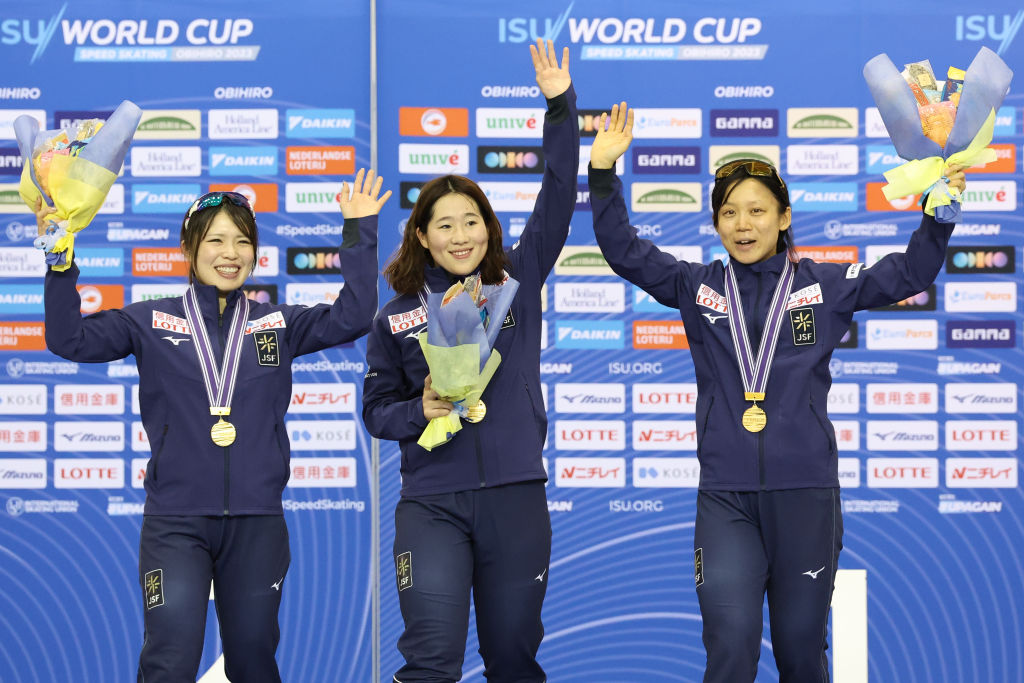
Takagi (right) was joined by Ayana Sato (left) and Momoka Horikawa (center) on the podium as Japan stormed to Team Pursuit gold © ISU
The gap was big, but Takagi didn’t want to jump to conclusions.
“Canada tried new tactics, so it’s difficult to compare at this moment, but we can do a lot better than we did today.”
Ivanie Blondin, Isabelle Weidemann, Valérie Maltais (CAN) were happy to take silver, experimenting with a strategy of pushing instead of taking turns up front.
“It was a good race for us today, working on the new strategy,” Maltais said.
Weidemann added: “We like doing new stuff, we always like having new goals to work on, regardless of where we're ranked in the world. It’s something to perfect a little bit and the Japanese have a second on us, so we have a challenge. I don't feel worried right now. It can be so much different next time.”
Joy Beune, Esther Kiel, Reina Anema (NED) took bronze for the Netherlands in 3:01.29. Kiel and Anema replaced Marijke Groenewoud and Irene Schouten in the line-up. Groenewoud and Schouten would normally skate with Beune in the strongest Dutch line-up, but they decided to skip this season’s first World Cup in Obihiro.
For all information about the ISU World Cup Speed Skating Series, please visit the webpage here.
All Media Accreditations details and deadlines for the ISU World Cup Short Track Speed Skating Series can be found here.
Where to watch
Viewers will be able to watch the World Cup sessions via their national broadcaster/channel.
For countries where there are no broadcasters, the ISU will offer a live stream with English commentary on the Skating ISU YouTube Channel. You will find the full list on the Where to watch webpage here.
Subscribe to the ISU YouTube Channel to receive all the latest videos and follow the conversation with #SpeedSkating.
ISU World Cup Short Track Speed Skating Series events 2023/24:
Nov 10 - 12, 2023 Obihiro /JPN
Nov 17 - 19, 2023 Beijing /CHN
Dec 01 - 03, 2023 Stavanger /NOR
Dec 08 - 10, 2023 Tomaszów Mazowiecki /POL
Jan 26 - 28, 2024 Salt Lake City /USA
Feb 02 - 04, 2024 Québec /CAN
About ISU World Cup Speed Skating Series
The ISU World Cup Speed Skating is a Series of Speed Skating competitions which have taken place annually since 1984. The series comprises six events (four during an Olympic season), with A Division and B Division races. Skaters can earn points at each competition, and the Skater with the most points on a given distance at the end of the series is the World Cup winner in that distance. The four World Cup Competitions held from November to December serve as qualifying events for entry quotas at the ISU European Championships, and the ISU Four Continents Championships. The whole series of six events serves as qualifying events for the World Single Distances Championships, and/or the World Sprint and Allround Speed Skating Championships.
World Cup titles are awarded in 500m, 1000m, 1500m, combined 5000m/10,000m, and Mass Start for men, and 500m, 1000m, 1500m, the combined 3000m/5000m, and Mass Start for women. Both genders also compete for the World Cup titles in Team Pursuit and Team Sprint. New in the 2023/24 program is the Mixed Gender Relay over six laps, in which teams of one man and one woman compete.
(For full explanation of this season’s ISU World Cup (entry rules, formats, qualifying, and prizes: https://www.isu.org/speed-skating/rules/ssk-communications/31562-isu-communication-2587/file)

